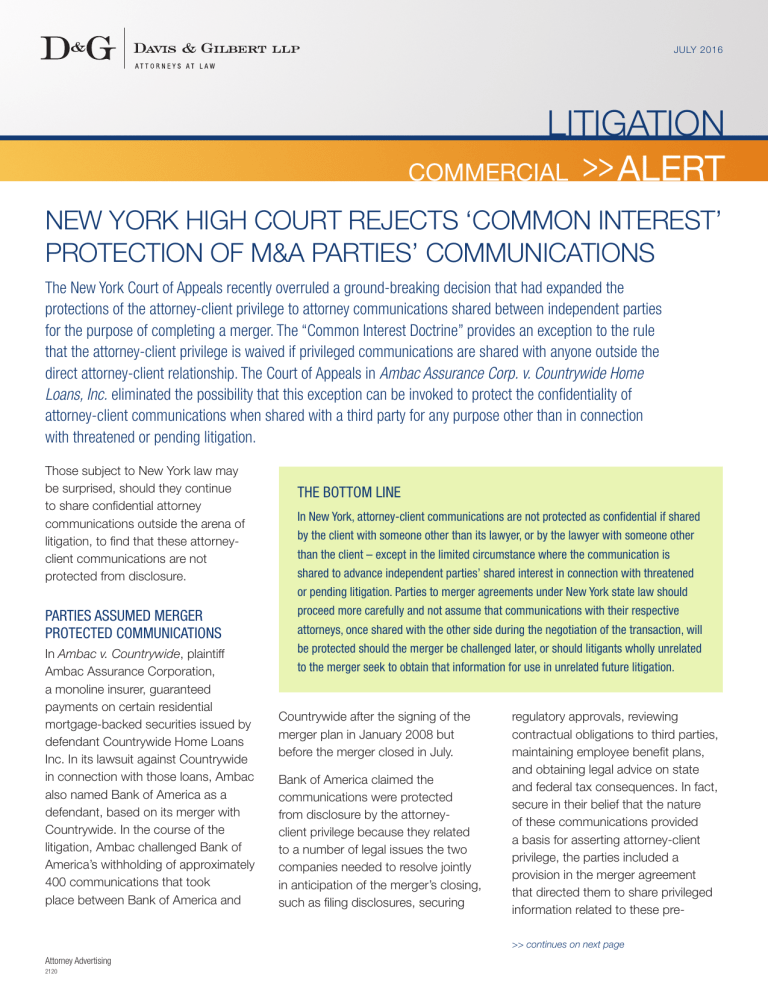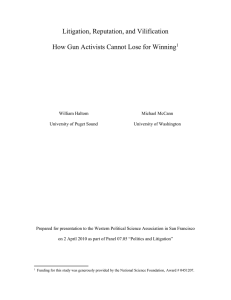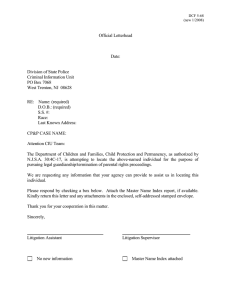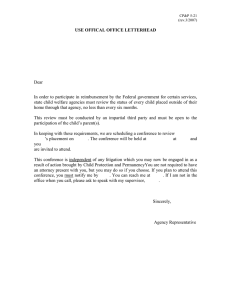Commercial Litigation Alert >> New York High Court Rejects

JULY 2016
LITIGATION
COMMERCIAL
>> ALERT
NEW YORK HIGH COURT REJECTS ‘COMMON INTEREST’
PROTECTION OF M&A PARTIES’ COMMUNICATIONS
The New York Court of Appeals recently overruled a ground-breaking decision that had expanded the protections of the attorney-client privilege to attorney communications shared between independent parties for the purpose of completing a merger. The “Common Interest Doctrine” provides an exception to the rule that the attorney-client privilege is waived if privileged communications are shared with anyone outside the direct attorney-client relationship. The Court of Appeals in Ambac Assurance Corp. v. Countrywide Home
Loans, Inc.
eliminated the possibility that this exception can be invoked to protect the confidentiality of attorney-client communications when shared with a third party for any purpose other than in connection with threatened or pending litigation.
Those subject to New York law may be surprised, should they continue to share confidential attorney communications outside the arena of litigation, to find that these attorneyclient communications are not protected from disclosure.
THE BOTTOM LINE
In New York, attorney-client communications are not protected as confidential if shared by the client with someone other than its lawyer, or by the lawyer with someone other than the client – except in the limited circumstance where the communication is shared to advance independent parties’ shared interest in connection with threatened or pending litigation. Parties to merger agreements under New York state law should proceed more carefully and not assume that communications with their respective attorneys, once shared with the other side during the negotiation of the transaction, will be protected should the merger be challenged later, or should litigants wholly unrelated to the merger seek to obtain that information for use in unrelated future litigation.
PARTIES ASSUMED MERGER
PROTECTED COMMUNICATIONS
In Ambac v. Countrywide , plaintiff
Ambac Assurance Corporation, a monoline insurer, guaranteed payments on certain residential mortgage-backed securities issued by defendant Countrywide Home Loans
Inc. In its lawsuit against Countrywide in connection with those loans, Ambac also named Bank of America as a defendant, based on its merger with
Countrywide. In the course of the litigation, Ambac challenged Bank of
America’s withholding of approximately
400 communications that took place between Bank of America and
Countrywide after the signing of the merger plan in January 2008 but before the merger closed in July.
Bank of America claimed the communications were protected from disclosure by the attorneyclient privilege because they related to a number of legal issues the two companies needed to resolve jointly in anticipation of the merger’s closing, such as filing disclosures, securing regulatory approvals, reviewing contractual obligations to third parties, maintaining employee benefit plans, and obtaining legal advice on state and federal tax consequences. In fact, secure in their belief that the nature of these communications provided a basis for asserting attorney-client privilege, the parties included a provision in the merger agreement that directed them to share privileged information related to these pre-
>> continues on next page
Attorney Advertising
2120
JULY 2016
LITIGATION
COMMERCIAL
>> ALERT
closing legal issues. The provision also included language purporting to protect the information from outside disclosure.
COMMON INTEREST
DOCTRINE LIMITED
Generally, communications between an attorney and a client that are made in the presence of third parties are not protected by the attorney-client privilege. However, under the exception known as the
Common Interest Doctrine, such a communication would remain privileged if it were made for the purpose of furthering a legal interest or strategy common to the parties.
When the Common Interest Doctrine first emerged, it provided a safe harbor for parties to share their communications with their respective attorneys without loss of the attorneyclient privilege – if the sharing took place in connection with threatened or pending litigation. Over the years, courts have grappled with whether to expand the safe harbor to include situations where the common legal interest is something other than threatened or pending litigation.
Before reaching New York’s highest court (the New York Court of Appeals), the case was heard by an intermediate level appellate court (the First Department), which held that the protection afforded by the Common Interest Doctrine should extend beyond the context of litigation. The First Department reasoned that imposing a litigation requirement “discourages parties with a shared legal interest, such as the signed merger agreement here, from seeking and sharing [legal] advice, and would inevitably result instead in the onset of regulatory or private litigation because of the parties’ lack of sound guidance from counsel.”
Therefore, that court held, “so long as the primary or predominant purpose for the communication with counsel is for the parties to obtain legal advice or to further a legal interest common to the parties, and not to obtain advice of a predominantly business nature, the communication will remain privileged.”
The Court of Appeals, however, reversed the First Department’s decision, holding in no uncertain terms that a communication must relate to litigation, either pending or anticipated, in order for the Common Interest exception to apply. The 400 attorneyclient communications shared between
Bank of America and Countrywide in furtherance of completing the merger transaction, therefore, had to be produced to adversary Ambac.
FOR MORE INFORMATION
Bruce M. Ginsberg
Partner
212.468.4820 bginsberg@dglaw.com
or the D&G attorney with whom you have regular contact.
Davis & Gilbert LLP
212.468.4800
1740 Broadway, New York, NY 10019 www.dglaw.com
© 2016 Davis & Gilbert LLP


